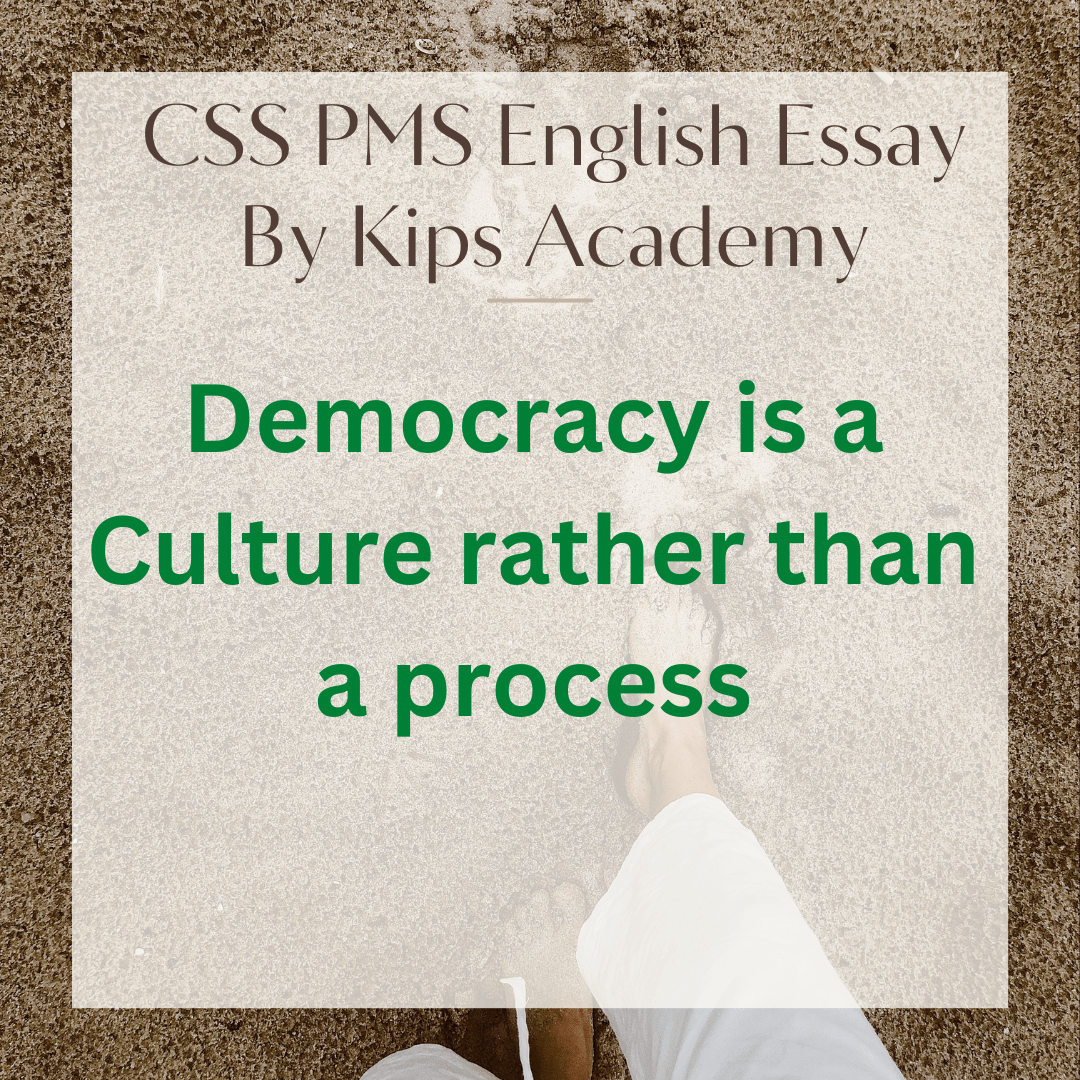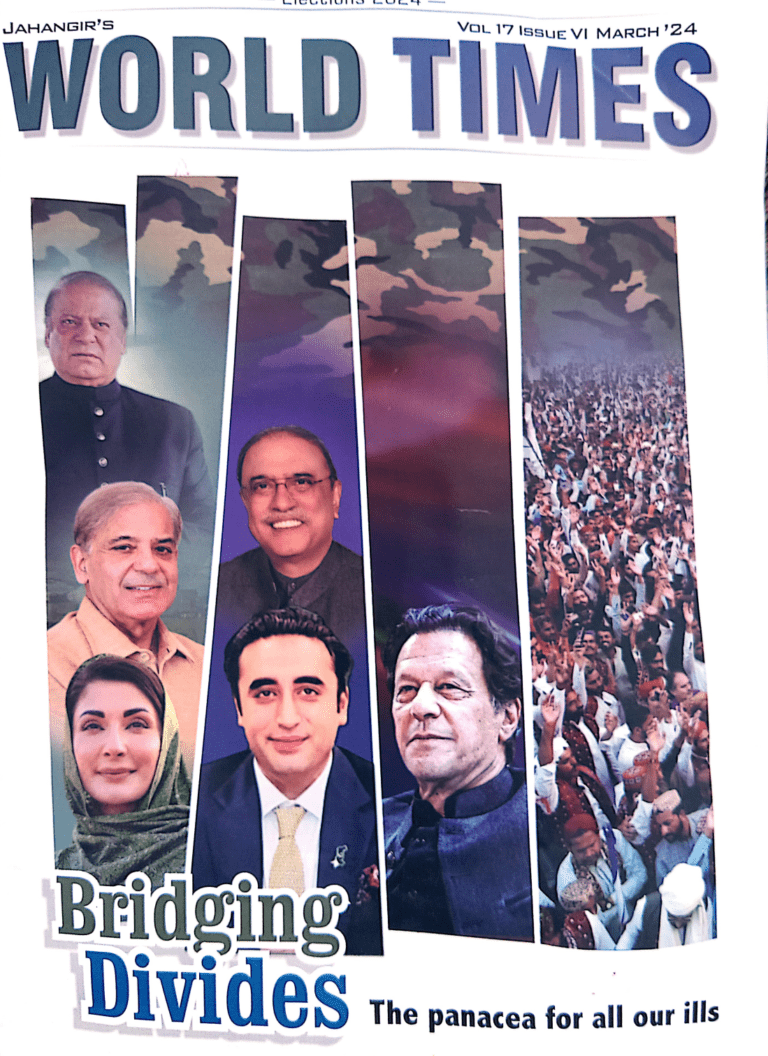CSS English Essay On Democracy. Democracy is a Culture rather than a process
Democracy, in its true essence, is the adaptation of democratic ideals, attitudes and values by a society in its social, economic and political spheres. An individual undergoes socialization throughout his or her life. The end product is a responsible citizen who can tell right from wrong and lives his or her life according to the norms and values of a society. Similar is the case with democracy- the democratic process gradually evolves from a process into a culture. This democratic culture influences the behavior and thought process of the members of society. As a result, the people are able to enjoy the true fruits of democracy. While the continuity of democratic process is essential for the establishment of institutions such as electoral systems, state institutions and government bodies, it is the democratic culture that develops the souls of these institutions by promoting a culture of accountability, rule of law and civic participation. A cursory view of the international setup reveals that although some countries have a democratic outlook, yet the lack of democratic culture has resulted in tyranny and oppression which are antithetical to the democratic ideals.
Democratic process is a necessary but not an exclusive requirement for a functional and effective democracy. It merely develops the external manifestations of democracy such as a parliament, judiciary, executive, and electoral system. Contrary to it, democratic culture embodies democratic ideals that ensure the fulfillment of the social, political and economic responsibilities by these institutions. It therefore represents a value system that is inter-related with moral, religious and symbolic narrative of any society. The democratic culture imbibes democratic values in the souls and minds of humans thereby ensuring that human actions and decisions contribute to the overall strengthening of democracy. More importantly, it is dynamic and grows in response to external challenges to democracy and ensures that the true spirit of democracy is transmitted to the future generations.
In the absence of a democratic culture, a country can never realize the dream of free and fair elections. Elections are one of the defining characteristics of democracy. They ensure the transfer of democratic power as well as the continuity of democratic process. The whole purpose of elections and the voting process is for people to elect representatives who will legislate on their behalf. However, in the absence of democratic culture, electoral process merely becomes an instrument of gaining power for inept politicians by stealing people’s mandate. Dictators, all over the world, use elections to create a false sense of legitimacy through rigged referendums. They use ‘democracy’ to impose their own will on the people. Similarly, in the absence of democratic culture, voters tend to vote on the basis of ethnicity, sect and political affiliations with complete disregard to the performance. The Ugandan elections of 2006 are a primary example of how rigged elections are a norm in countries where democracy is merely treated as a process to cling on to power. The election was characterized by controversies with the Museveni led government accused of intimidating the opposition leaders and their supporters including arrests and detention. On the other hand, a democratic culture ensures transparent, free and fair elections through a system of checks. It ensures that people realize their civic responsibility of voting and reject incompetent politicians. Therefore, a democratic setup based on merit is established that strengthens the foundations of democracy in a country.
Moreover, state institutions- formed as a result of democratic process can never discharge their responsibilities in a prudent manner in the absence of democratic culture. The key state institutions such as the legislature, executive and judiciary are pivotal for the growth of democracy in any country. Their purpose is to make laws. implement them and dispense justice in line with the principles of constitutional governance. However, in the absence of democratic culture, politicians use national resources for their own personal gains and the judiciary is unable to dispense speedy and cheap justice. As stipulated in the book Why Nations Fail, such extractive institutions mean that corruption becomes rampant and good governance becomes a wishful dream. On the other hand, democratic culture would entail inclusive institutions that enable citizens to participate in the administrative and financial decision making of the country through local bodies. This clearly shows that the mere establishment of state institutions through a democratic process does not necessarily translate into a genuine and functional democracy.
Similarly, the mere formulation of political parties is futile unless the party leaders adhere to democratic norms and values. Political parties are the major drivers of democracy. They provide a platform to common people to realize their political ambitions and raise consciousness among the masses through election campaigns. However, it is seldom the case when democratic culture has not fully materialized. Political parties in such families are controlled by a single family which runs it like a family business. Thus, a single family rules the party and, in some cases, the country as well for decades. However, in a democratic culture, democracy starts from the grass root level. Intra-party elections are a norm and democratic values are inculcated in the political workers from an early stage. Once they have fully embraced the democratic culture, they further work towards strengthening democracy in the country when they come into power. So, democracy is no democracy until the political parties adopt the democratic culture.
In addition, establishment of true democracy in a country is deeply connected with the economic system of a country. Usually, countries which lack a democratic culture are more prone to economic instability; lack of institutional checks and balances and over- saturation of state owned enterprises. Since the decisions are mostly political in nature, they seldom translate into economic prosperity. Contrary to it, democratic culture encourages the practice of economic liberalization and promotes market economy. Moreover, democratic culture also believes in the equality of economic opportunities, every person is allowed to pursue his economic ambitions. The result is an overall economic growth and increase in per capita income. Paul Collier in “5 myths about the beauty of ballot box” has cited $2700 per capita income as a threshold to democracy. Thus, democracies are more effective and less prone to violence if majority of the people are above the poverty line. This shows a deep correlation between democratic culture and the economic health of a country.
A free and responsible media becomes an elusive dream in the absence of democratic culture. Media plays the role of a neutral watchdog over public institutions and keeps an eye on the irregularities within a democratic system. Its purpose is to shape public opinion and inform the public about democratic values. However, in the absence of a democratic culture, media is simply an instrument of oppression in the hands of incompetent rulers and dictators. They use it to muster support for their own agenda and as a means of propaganda and indoctrination. A prime example in this regard is that of the Indian media under Narendra Modi. He has been accused by various intellectuals of using the Indian media for winning people’s support by tugging at people’s nationalistic sentiments in a bid to secure victory in the general elections. Contrarily, in a democratic culture, principle of impartiality is emphasized upon and media is expected to follow journalistic ethics. Independence of media and freedom of expression are ensured so that media can effectively contribute towards the development of true democracy. Hence a free and impartial media- which is at the heart of democracy- can only thrive when democracy is adopted as a culture.
Democratic culture is also extremely crucial for safeguarding people’s fundamental rights, which are considered the essential pre-requisites of democracy. Some fundamental rights such as the right to life, religion, speech and privacy have constitutional protection in almost all countries. However, in the absence of a democratic culture, rulers blatantly disregard these human rights. The result is a society that is democratic in form but totalitarian in essence. Thus, it is impossible for democracy to grow in such societies because the circumstances are not supportive of it. However, in the presence of a democratic culture, fundamental rights are associated with individual dignity, self-esteem and establishment of a harmonious social order. Therefore, every possible effort is made not only by the government but also by civil society to protect the civil and political liberties of individuals. Hence, human rights can only be safeguarded under a democratic culture.
Rule of law becomes a distant dream if those at the helm of affairs are not prepared to live by the democratic norms. Rule of law ensures that nobody is above the law and ensures equal treatment to all citizens. In the absence of a democratic culture, those at the helm of affairs blatantly commit crimes and corruption and repeatedly get away without any sort of punishment. The weaker segments of the society are the ones who bear the major brunt of this discriminatory legalism. They are punished for petty crimes while the influential people are immune from any sort of danger. On the other hand, in a democratic culture, everybody is equal in the eyes of law. Nobody has any sort of advantage over the others on account of his status or prestige. Hence, rule of law can only materialize in societies that have seen a transition from democratic process to a democratic culture.
Moving on, democratic norms and values are a must for laying the foundations of a pluralistic society. Pluralism is often believed to be a sine-qua-non for democracy to flourish. A pluralistic culture connotes various groups of people living together in the society peacefully. In the absence of a democratic culture, pluralism becomes a distant dream. Under such circumstances, the majority ends up benefitting while the minorities see their rights being compromised. There is very little room for difference of opinion. Contrarily, a democratic culture celebrates diversity and epitomizes tolerance. Innovation reigns supreme in a pluralistic society and rights are given to one and all irrespective of their religion, caste, color and creed. An example worth mentioning in this regard is that of Canada. Under Justin Trudeau, Canada boasts a diverse population that lives in harmony making the country one of the most pluralistic countries. Hence, democratic culture lays the foundations of a pluralistic society.
It took countries like USA and Britain centuries to develop a democratic culture. However, it is important to mention here that during this period, the democratic process was allowed to continue uninterrupted. Finally, these countries embraced the democratic culture in their political, economic and social lives. In these societies, democracy is not a form of government but a way of life which has resulted in protection and promotion of cultural diversity and encourage active participation. On the other hand, countries like India, Pakistan, Afghanistan and Philippines which are democratic in form- have failed to develop a democratic culture. As a result, these countries are suffering from economic instability, poverty, oppression and political uncertainty. Civic participation is the lowest in these countries as people have limited control over their economic and political decisions.
The spirit of democracy can be inculcated in humans by promoting democratic culture in a society. Since family is the basic unit of a society and culture, it is necessary that democratic ideals are taught to children during their early years. Like any culture, democratic culture is also learnt through the process of socialization. Thus, family can play a critical role in the development of democratic customs, traditions, norms and values as it provides the first opportunity to the child to socialize. Similarly, transfer of democratic culture to the future generations is also important and it can be transmitted through education. Education is a vital component of any society but specially of a democracy. As Thomas Jefferson wrote: “If a nation expects to be ignorant and free, in a state of civilization, it expects what never was and what never shall be.” The aim of democratic education is to produce citizens who are independent, questioning and analytical in their outlook yet deeply familiar with percepts and practices of democracy.
Democracy is more than the sum of its institutions. A healthy democracy depends in large part on the development of a democratic civic culture. Culture in this sense does not refer to art, literature or music but to the behaviors, practices and norms that define the ability of a people to govern themselves. Democratic culture, as established in the essay, is crucial for any society to enjoy the true fruits of democracy. This calls upon all countries to prioritize the materialization of a democratic culture. Teaching the masses regarding the importance of democratic culture through agents of socialization is the key to success in this regard. In a nutshell, it is the evolution of democracy that develops a democratic culture, which in turn leads to true democracy.
This essay was taken from the Kips Academy English Essay Book. To Buy This book click on the following link button or WhatsApp 0332-5339708







